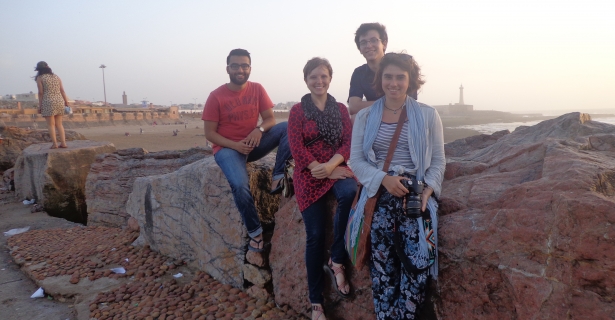My introduction to Morocco has been somewhat of a blast into the past. Walking through Jama-al-Fna and the souks surrounding it in Marrakech felt like I was walking not just through a place that was foreign to me, but a time that was foreign as well. The streets are narrow, crowded with hawking vendors, smiling and hustling their wares in Darijah, Arabic, French, Spanish and English, with the occasional broken bits of Japanese and Hindi as well. They are selling handcrafted items, from shoes and scarves to tagines and tea sets, beautiful daggers and freshly ground spices. The thatched roofs above the streets lend an additional air of something ancient; if you ignore the sounds of radio and the lights, and pretend that there are no cell phones anywhere and that the scooters you see whizzing by are really just figments of your imagination, it becomes easy to believe that perhaps our plane here was really a time machine, that this is what life might have been like centuries ago.
I had thought that Marrakech was something ancient, but Fes was really the pinnacle of that feeling. The entire old city is walled in by a great fortified wall that has stood guard around the bustling, crowded, overflowing city for centuries. It is a maze of streets, easy to get lost in alleyways the size of a man and a half standing shoulder-to-shoulder, and bigger streets known as Tal’as which are not much wider. It is too small for automobiles, but not small enough to deter motorcyclists. It is a city of artisans: in the tannery you can see the lengthy, smelly process from a carcass to a handbag, done the way it has been since time immemorial, before the wonders of faux leather were introduced. You can see individual strands of brightly dyed threads being merged in a pedal-powered loom into breathtaking yards of fabric, to be cut and sewn into dresses and hijabs and bed sheets and jalaabas. In another corner of the city you can see men with safety goggles chipping away at slabs of marble, engraving Arabic calligraphy into the stone before filling in the depressions with brilliant paints, to be used as decorations for the living or as headstones for the dead.
There’s something very surreal about being able to witness all of this, of walking through the arteries of the city and haggling with shopkeepers over the correct prices for their wares, about asking for freshly squeezed juices and freshly-killed-meat sandwiches. There’s a connection to everything and everyone; no plastic wraps to bar you from your food, no price tags to limit your interaction with shopkeepers.
Fes has also been renowned as the educational center of Morocco and indeed the region at large. The world’s first University was founded here, at the hands of a woman who wanted to establish an institution for higher learning the likes of which have since risen the world over. There are schools and madrassas here, with such incredible detail carved and painted in every inch of their walls, in every corner of their rooms, that it seems a metaphor for the learning that did, and does, take place in the grand halls: that perhaps learning is a slow process, when done correctly it will beautify everything it touches even tangentially, that knowledge and patience go hand in hand and result in something breathtaking in the end, something that everyone can learn and benefit from, at the very least appreciate with even the most cursory of glances.
The culture of hospitality is incredible as well. It took us almost a week to pay for our first pot of tea, even though we have had the pleasure of enjoying some everyday, often on multiple occasions throughout the day. It is not uncommon for shopkeepers to offer you a cushion to sit on their tiled floors, and to bring you tea to sip on while you sit and chat about life while people come and go around you. It is not uncommon to be asked by complete strangers, who guess with amazing accuracy, what part of the globe you hail from. When they confirm their suspicions that you are indeed not Moroccan, they take the opportunity to welcome you to their country, as if you are their own guests. When you make the effort to respond in broken chunks of formal Arabic, perhaps with a word or phrase Darijah sprinkled in for garnish, they will be overcome with enthusiasm and surprise, complementing and encouraging you on your interest in their language and ways.
It’s only been a few days in Morocco, but the endless hospitality of the people coupled with the magical feel of the country, especially in these historical cities, makes it very easy to feel at home. It will make the end of this trip more bitter than Moroccan mint, but the memories sweeter than Moroccan tea.

